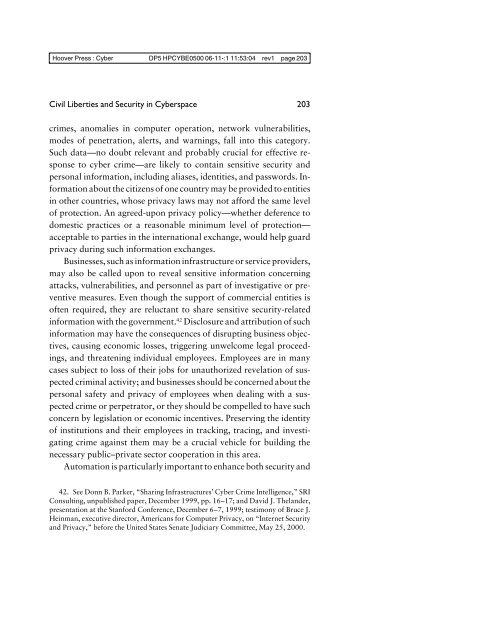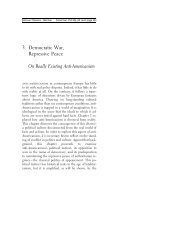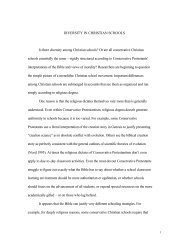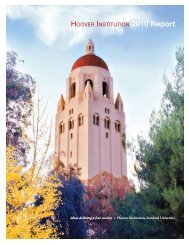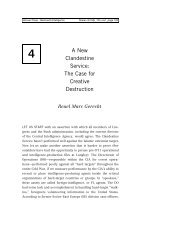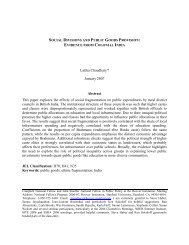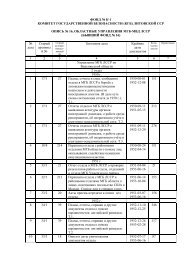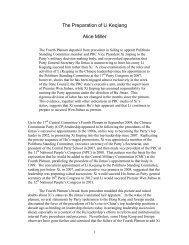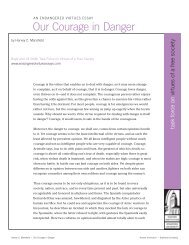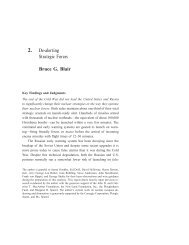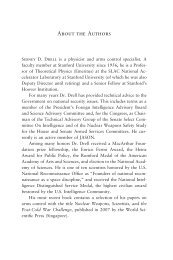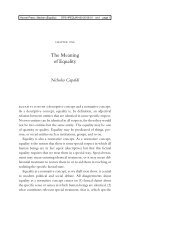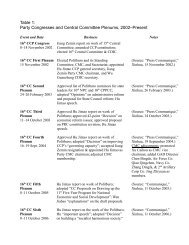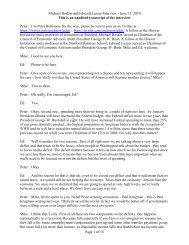Civil Liberties and Security in Cyberspace - Hoover Institution
Civil Liberties and Security in Cyberspace - Hoover Institution
Civil Liberties and Security in Cyberspace - Hoover Institution
You also want an ePaper? Increase the reach of your titles
YUMPU automatically turns print PDFs into web optimized ePapers that Google loves.
<strong>Hoover</strong> Press : Cyber DP5 HPCYBE0500 06-11-:1 11:53:04 rev1 page 203<br />
<strong>Civil</strong> <strong>Liberties</strong> <strong>and</strong> <strong>Security</strong> <strong>in</strong> <strong>Cyberspace</strong><br />
203<br />
crimes, anomalies <strong>in</strong> computer operation, network vulnerabilities,<br />
modes of penetration, alerts, <strong>and</strong> warn<strong>in</strong>gs, fall <strong>in</strong>to this category.<br />
Such data—no doubt relevant <strong>and</strong> probably crucial for effective response<br />
to cyber crime—are likely to conta<strong>in</strong> sensitive security <strong>and</strong><br />
personal <strong>in</strong>formation, <strong>in</strong>clud<strong>in</strong>g aliases, identities, <strong>and</strong> passwords. Information<br />
about the citizens of one country may be provided to entities<br />
<strong>in</strong> other countries, whose privacy laws may not afford the same level<br />
of protection. An agreed-upon privacy policy—whether deference to<br />
domestic practices or a reasonable m<strong>in</strong>imum level of protection—<br />
acceptable to parties <strong>in</strong> the <strong>in</strong>ternational exchange, would help guard<br />
privacy dur<strong>in</strong>g such <strong>in</strong>formation exchanges.<br />
Bus<strong>in</strong>esses, such as <strong>in</strong>formation <strong>in</strong>frastructure or service providers,<br />
may also be called upon to reveal sensitive <strong>in</strong>formation concern<strong>in</strong>g<br />
attacks, vulnerabilities, <strong>and</strong> personnel as part of <strong>in</strong>vestigative or preventive<br />
measures. Even though the support of commercial entities is<br />
often required, they are reluctant to share sensitive security-related<br />
<strong>in</strong>formation with the government. 42 Disclosure <strong>and</strong> attribution of such<br />
<strong>in</strong>formation may have the consequences of disrupt<strong>in</strong>g bus<strong>in</strong>ess objectives,<br />
caus<strong>in</strong>g economic losses, trigger<strong>in</strong>g unwelcome legal proceed<strong>in</strong>gs,<br />
<strong>and</strong> threaten<strong>in</strong>g <strong>in</strong>dividual employees. Employees are <strong>in</strong> many<br />
cases subject to loss of their jobs for unauthorized revelation of suspected<br />
crim<strong>in</strong>al activity; <strong>and</strong> bus<strong>in</strong>esses should be concerned about the<br />
personal safety <strong>and</strong> privacy of employees when deal<strong>in</strong>g with a suspected<br />
crime or perpetrator, or they should be compelled to have such<br />
concern by legislation or economic <strong>in</strong>centives. Preserv<strong>in</strong>g the identity<br />
of <strong>in</strong>stitutions <strong>and</strong> their employees <strong>in</strong> track<strong>in</strong>g, trac<strong>in</strong>g, <strong>and</strong> <strong>in</strong>vestigat<strong>in</strong>g<br />
crime aga<strong>in</strong>st them may be a crucial vehicle for build<strong>in</strong>g the<br />
necessary public–private sector cooperation <strong>in</strong> this area.<br />
Automation is particularly important to enhance both security <strong>and</strong><br />
42. See Donn B. Parker, “Shar<strong>in</strong>g Infrastructures’ Cyber Crime Intelligence,” SRI<br />
Consult<strong>in</strong>g, unpublished paper, December 1999, pp. 16–17; <strong>and</strong> David J. Thel<strong>and</strong>er,<br />
presentation at the Stanford Conference, December 6–7, 1999; testimony of Bruce J.<br />
He<strong>in</strong>man, executive director, Americans for Computer Privacy, on “Internet <strong>Security</strong><br />
<strong>and</strong> Privacy,” before the United States Senate Judiciary Committee, May 25, 2000.


